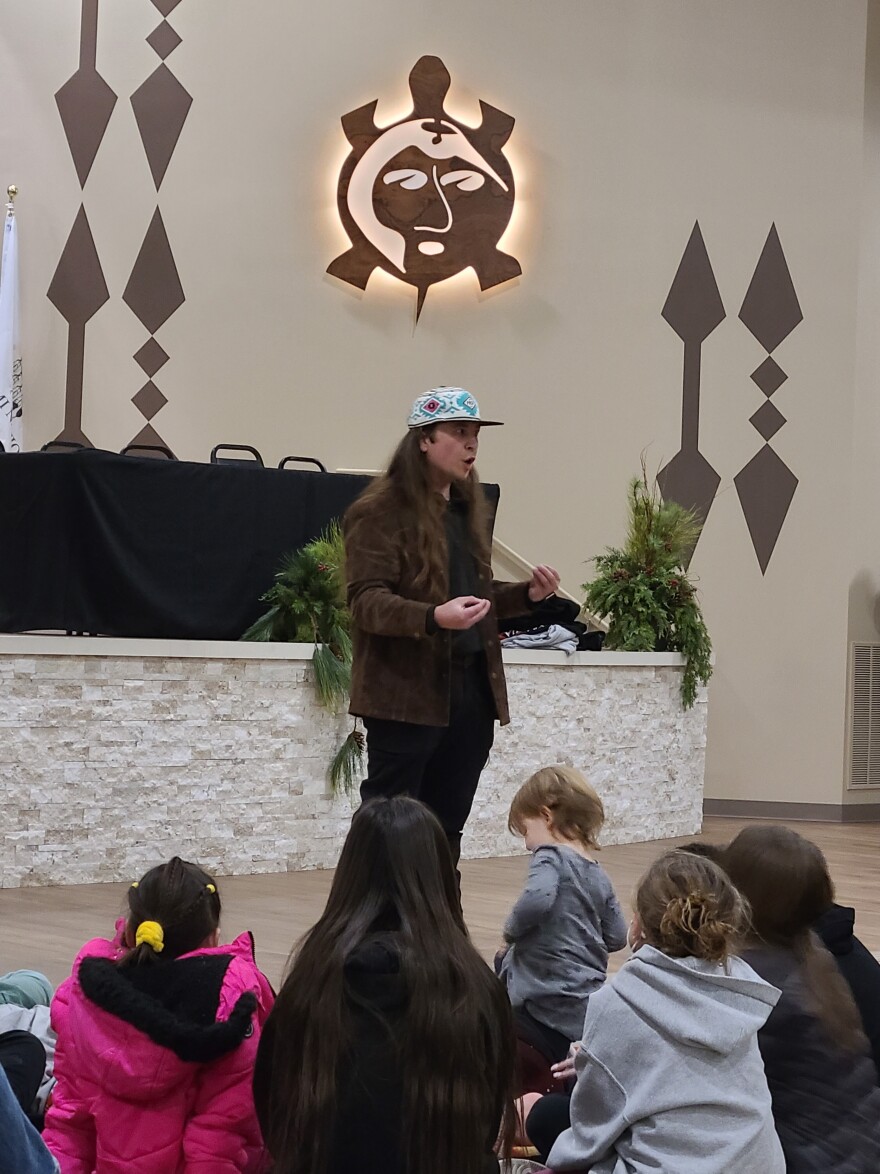The Miami Tribe of Oklahoma's annual Winter Gathering, held the last weekend in January, is an opportunity to share aalhsoohkaana or "winter stories."
"A winter storytelling event for Myaamia people is a time we gather together to tell stories that are really special and important to us that can only be recounted in the winter time," explains George Ironstrack, assistant director of the Myaamia Center at Miami University. "Those stories tell us about how the world came to be as it is, or as we understand it as Myaamia people, and help us understand our ever-evolving place within that world."
Some 100 Miami University staff and students traveled to Oklahoma this past weekend to attend the Winter Gathering and cap off a yearlong commemoration of the university working collaboratively with the Miami Tribe. The two Miamis formed a partnership in 1972 that has grown and evolved, resulting in, among other things, a cultural revitalization.
RELATED: Winter Gathering caps 50th anniversary commemoration of the two Miamis
'The stories went silent'
One outcome of that work has been finding and learning Myaamia stories that hadn't been told in many years. The stories are important because some are historical narratives that center on past events and the lives of Myaamia ancestors. Other stories — winter stories — are often about beings and animals that are treated with respect by the Myaamia.
"The event is especially important because there was a period of time when these stories were not told in community. The stories went silent," says Ironstrack. "For us, it's doubly meaningful because we're revitalizing the knowledge of how to tell these stories and so their impact is even stronger because they've been absent from community for a period of time."

While there, the Miami University visitors joined with Myaamia people in listening to some of these stories. The event started with a large communal meal of traditional foods like venison, white corn (hominy), buffalo, sunchokes (a tuber also called Jerusalem artichokes), and wild rice.
Afterward, people gathered in a large space — in this case the Council House — and a storyteller called the group to order by recounting a quote from Wiihsakacaakwa (wee-SAHK-uh-CHOCK-wuh), "a being of immense power and unequaled foolishness" that reminds listeners of the importance of storytelling.
From there, storytellers took turns recounting various stories in English and myaamiaataweenki (the Myaamia language). Some pictures are included here, but no audio or video recordings are allowed. Ironstrack explains the stories are meant to be experienced in the moment.
"When we breathe life into a story, what we mean is we take it from either your memory — that's how you learn the story — or from a written page, and you make the story come alive by performing it. By giving ... personality and voice to the beings in the story, that's bringing a story to life and that exists in a special way just in the moment that you're telling it," says Ironstrack.
While the stories might sound to some like cautionary tales or Aesop's fables, Ironstrack says it's a misconception to say tribal stories are simple mythology.
"They're deeply complex," he notes. "Our understandings of them continue to change throughout our lives as we continue to interact with the stories as individuals and as a community. They're deeply cosmological, but you have to spend a good amount of time, your lifetime really, with them to begin to feel that complexity."
Reclaiming Myaamia stories
How can people tell stories that had been lost to time? Ironstrack explains:
"In the late 1800s, as our speaking population really diminished (and) as certain aspects of our cultural practices started to go dormant, a fairly large — at least for us — cohort of storytellers and knowledge bearers sat down with professional linguists and anthropologists, as well as lay, trained linguists to record a lot of these stories, both in our language and in English."
RELATED: Chief of Miami Tribe talks 50 years of partnership with Miami University
Those stories were then preserved in various archives across the United States.
In the late 1980s, David Costa, Ph.d., began studying the Miami-Illinois language. He has worked with the tribe on language revitalization since the mid-'90s, including finding the archived stories, transcribing them, putting them into modern language, and publishing them.
"The tribe then published his work in a storybook publication that went out to tribal households," Ironstrack concludes.
WVXU's Tana Weingartner was invited to attend and report on the Myaamia Winter Gathering in Miami, Okla. She's filing a series of stories for WVXU and WMUB.



